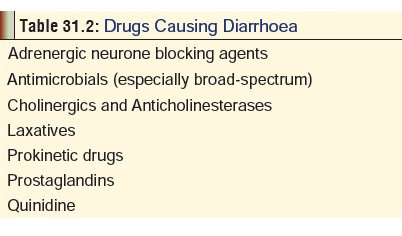Chapter: Modern Medical Toxicology: Miscellaneous Drugs and Poisons: Gastrointestinal and Endocrinal Drugs
Antidiarrhoeals
Antidiarrhoeals
Most
antidiarrhoeals (like laxatives) tackle the symptom but not the underlying
cause which is usually infectious in nature. Therefore antimicrobial therapy is
mandatory most of the time. However, there are several types of diarrhoea
(secretory diarrhoeas) which have a non-infectious cause and must be treated
differently, e.g. diarrhoea due to carcinoid syndrome, drug-related diarrhoea,
etc. Table 31.2 lists some common
drugs associated with diarrhoea.

Classification
■■ Opiates – diphenoxylate, difenoxin, loperamide
■■ Bismuth subsalicylate
■■ Octreotide.
The
opiates and bismuth salts have been discussed in detail elsewhere (consult Index).
Octreotide
Octreotide,
the acetate salt of a cyclic octapeptide, is the synthetic analogue of
somatostatin, a hormone which inhibits the release of somatotropin (human
growth hormone), and insulin secretion. It has to be administered parenterally,
and is usually injected subcutaneously. It is used in the treatment of
refractory diarrhoea (e.g. AIDS-related diarrhoea), Zollinger-Ellison syndrome,
endocrine tumours related to the GI tract (carcinoid, gastrinoma, insulinoma,
etc.) and acromegaly. Additional uses include treatment of congenital
hyperinsu-linism (nesidioblastosis), chylothorax, prolonged recurrent
hypoglycaemia after sulfonylurea overdose, severe rheumatoid arthritis, hepatic
hydrothorax, severe pancreatitis, diabetic retinopathy and variceal bleeding.
Adverse
effects include anorexia, nausea, GI upset (diar-rhoea/steatorrhoea,
constipation, abdominal discomfort, flatulence), cholelithiasis,
hypoglycaemia/hyperglycaemia, pancreatitis, hypothyroidism, sinus bradycardia,
conduction abnormalities and arrhythmias.
Overdose
data is limited; hypoglycaemia, flushing, dizzi-ness and nausea have been
reported.
Treatment
·
Monitor blood glucose, CBC, ECG, and
liver function in symptomatic patients.
·
Monitor fluid and electrolyte status
in patients with signifi-cant nausea and vomiting.
·
Significant toxicity is not
anticipated after ingestion because of limited bioavailability. Consider
gastric decontamination only after very large ingestions.
·
There is no antidote for octreotide
overdose. Overdose treatment is symptomatic and supportive.
Related Topics